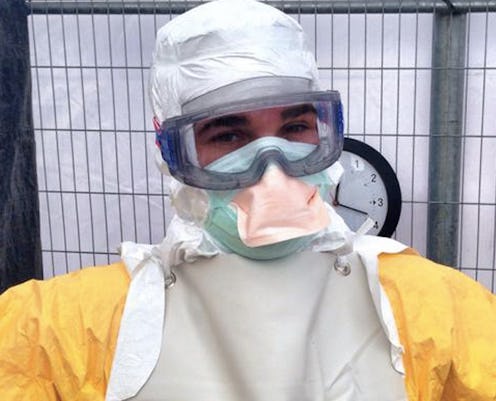News
Did He Just Take A Turn For The Worse?

Just a few days after his initial diagnosis, Craig Spencer's condition has worsened as he enters the "next phase" of Ebola. Doctors at Bellevue Hospital in New York report that they anticipated this change as Spencer began to experience the "more serious phase of his illness," including the onset of gastrointestinal symptoms. Spencer, however, remains in good spirits, and was able to conduct a short interview with the New York Times via the telephone on Saturday evening. The 33-year-old Doctors Without Borders volunteer told the paper that he'd received "about 200 calls from reporters and 300 emails," but that his condition prevented him from addressing all his contacts' concerns. "When you have Ebola, he said," answering your phone is "not the best way to spend your time."
The Times reported that Spencer was "careful not to convey a sense of pessimism," and assured reporters that he was "feeling well." Despite the advancement of the disease, doctors and other health experts have noted that Ebola patients often undergo this slight dip in condition before seeing any major improvements. "People tend to get worse before they get better," Dr. Mary Bassett, the commissioner of the city Department of Health and Mental Hygiene, told a local NBC News station. "So he remains in stable condition but we are aware that this is the natural course of this disease."
Many Ebola patients begin to suffer from diarrhea at this stage of the illness, which if untreated, can cause massive fluid and electrolyte loss. As such, a key part of doctor's treatment strategy when dealing with Ebola relies on supportive care — rehydration by way of IVs or other fluid delivery systems is crucial to surviving Ebola. Without enough water or electrolytes, a patients kidneys can begin to shut down, which in turn affects the heart. These critical organs must remain functional in order to allow the body's immune system to naturally ward off the disease, which is why treatment during the first few stages of Ebola are so important. New York Mayor Bill de Blasio noted, "The phase ahead will be a tough one. By definition, the days ahead will be tough for Dr. Spencer."
In order to help him fight the disease, Spencer received a blood transfusion from Ebola survivor Nancy Writebol, who was one of the first two Americans treated in the United States. She, along with fellow survivor Dr. Kent Brantly, have donated blood to several patients now, including NBC News cameraman Ashoka Mukpo and Dallas nurse Nina Pham. Thus far, it seems that these transfusions have been relatively effective as a partial treatment for the disease, as all of the American patients who have received blood from a survivor have beat Ebola.
Spencer is also receiving doses of the experimental treatment, Brincidofovir. According to the New York Daily News, five doses of the drug are distributed over the course of two and a half weeks, and Spencer has already received his first treatment. Brincidofovir seemed to help Mukpo recover from Ebola, but Thomas Eric Duncan, the only person to die in the United State from Ebola thus far, also received the experimental treatment to no avail.
While doctors were updating reporters on Spencer's condition, his fiancee, Morgan Dixon, was permitted to leave the hospital and return home to their apartment in Harlem, where she will be kept under mandatory quarantine for 21 days. Dixon will be carefully monitored, as Spencer has been in close contact with her since he first returned to the United States on October 17. Two of his friends have also been quarantined, and will remain under supervision until November 14.
While tension around New York City and the country at large remain high, President Obama urged Americans on Saturday to remember that every American treated in the United States has survived. Said the president,
It's important to remember that of the seven Americans treated so far for Ebola — the five who contracted it in West Africa, plus the two nurses from Dallas — all seven have survived. Let me say that again: seven Americans treated; all seven survived.
In attempts to ensure that this statistic remains true, New York and New Jersey have recently implemented strict mandatory quarantine rules for travelers returning from West Africa. This has met with considerable resistance from both travelers and public health officials, who warn that the quarantine may have adverse side effects, including eliminating much needed aid from the hardest hit regions of Africa. Dr. Anthony Fauci, director of the National Institute of Allergy and Infectious Diseases, told the Associated Press that he was against the quarantine. Said Fauci,
The best way to protect us is to stop the epidemic in Africa, and we need those health care workers so we do not want to put them in a position where it makes it very, very uncomfortable for them to even volunteer to go.
Kaci Hickox, an epidemiologist who recently returned from treating Ebola patients in Sierra Leone, has blasted the "knee-jerk reaction by politicians" to the disease. Hickox has twice tested negative for the virus, and has no symptoms whatsoever. When speaking to CNN's Candy Crowley on State of the Union, Hickox said, "This is an extreme that is really unacceptable, and I feel like my basic human rights have been violated."
But until Spencer's steps have been fully retraced and the doctor's condition stabilizes, it seems that regardless of others' opinions, the quarantine will remain solidly in place.
Images: Getty Images (4); Independent, nypost/Twitter